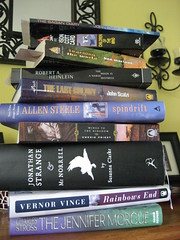 Image by Jay Garmon via Flickr
Image by Jay Garmon via Flickr
The counterpoint to the broad, almost aspirational definition of spec-fic is the what might be called the geek brand of spec-fic, wherein the term is used to classify works that don't neatly fit into one classic genre or subgenre. For example, Harry Turtledove's Guns of the South posits what would happen if time-travelers gave modern weapons to the Confederacy during the U.S. Civil War. This is quite obviously a sci-fi tale, as the time travel points out, but the novel also focuses on clear historical events and consequences, making it very much an alternate history tale. Spec-fic is a term that bridges the gap between the genre divisions that fandom (and book marketers) often use to segregate nerd-worthy literature.
I bring it up because: Today is author Cherie Priest's birthday, and her career is a fantastic example of the straddling of (false) genre divisions that fans love and expect (and drives book marketers a little nuts). Her debut novel, Four and Twenty Blackbirds, is a southern gothic, modern fantasy, and horror tale. Her most recently released novel, Fathom, is a combination historical fiction, southern gothic, mythpunk-slash-Chthulhu-slash-pirate tale. Priest's upcoming novel, Boneshaker, is set in her new Clockwork Century universe, which crosses alt-history Civil War fiction with steampunk, Weird West, horror, and maybe a little sci-fi for fun.
And if you think Priest's bibliography is a tad difficult to classify, try China Mieville on for size. I think his Perdido Street Station has about 57 genres and subgenres contained within it, and that's before you even get to the poetic, murderous, reality warping spider-god (who is a side character, mind you). You might also enjoy Charles Stross's Jennifer Morgue, which is a postcyberpunk-Chthulhu-spy-fi meta-satire. With a heroic mermaid succubus as the female lead. Lots of that doesn't show up on the cover blurb, as you might imagine.
Thus we have yet another reason I wish my local bookstore (and my new favorite online bookstore) would have multiple overlapping genre categories -- because spec-fic is too broad a term for most of what I love, and lots of the books I read fall into so many subgenres that they defy description, but certainly not enjoyment.
![Reblog this post [with Zemanta]](http://img.zemanta.com/reblog_e.png?x-id=62256938-8376-4c15-b101-de994dd38b78)
No comments:
Post a Comment